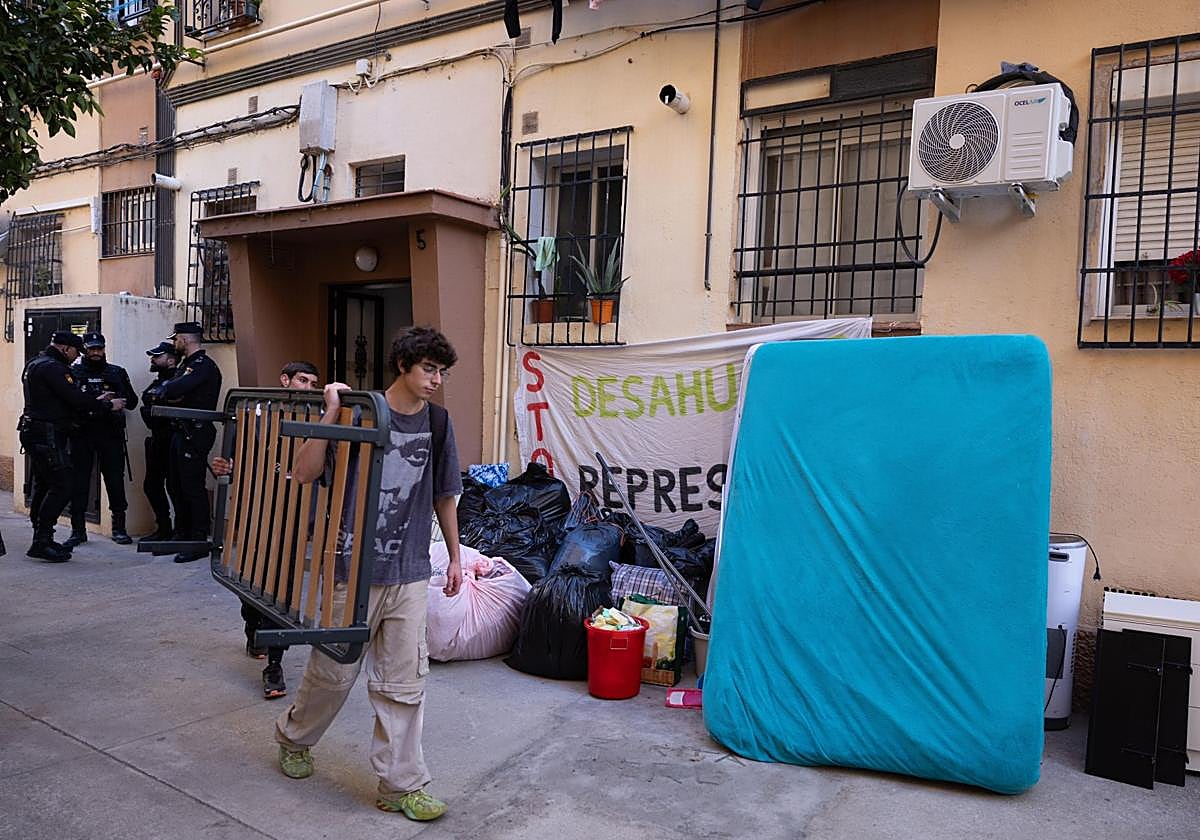Woman and three children evicted from Malaga home despite pressure from neighbours and associations
"We have nothing against the owner, he has the right to recover his home," said those who gathered to stop the eviction, who are demanding measures from the city council to provide alternative housing
It was a few minutes past eight on Wednesday morning when a group of people gathered at the entrance of one of the buildings in Calle Obispo Juan de Eulate, in the Las Flores neighbourhood.
They came to show their support for Josefa, 43, and her three children, aged 15, nine, and four. Above all, they wanted to support what the family was hoping to achieve: an extension of five more months to allow time for the school year to finish, making their departure from the home less traumatic for the children.
This way, they would not suddenly disappear from their classes overnight or have to give awkward explanations at their new school about the abrupt nature of their arrival well into the second term.
As this almost half a year seemed very difficult to achieve, they suggested to the owners that they could stay an extra month to organise the move. Their next destination would be Loja (Granada), where they would be welcomed by the family of the mother, who has lived in Malaga for two decades, more than half of her life, and whose three children are also from Malaga and have all their friends here.
However, it has not been possible. The date of the eviction was Wednesday 5 February, and it went ahead according to plan. There were two other eviction dates marked on the calendar for this family, but they were suspended - the last one last October - due to the vulnerable nature of this single-parent family who have been living in the house for a decade, but who two years ago stopped paying the rent due to a series of circumstances: Josefa separated from her husband, and although he pays her the corresponding maintenance, and she works as a street vendor, she cannot afford to pay the rent, which amounts to 500 euros.
With her income, she barely has enough to pay the bills and to eat. Some time ago, she was a beneficiary of municipal help to pay the rent, but it ran out, and according to the new benefit regulations, if you have already been a beneficiary of such support to pay for housing, you cannot be a beneficiary again. And, furthermore, she has been denied the receipt of the minimum living income because there are other people registered in that house, possibly people who previously occupied the house.
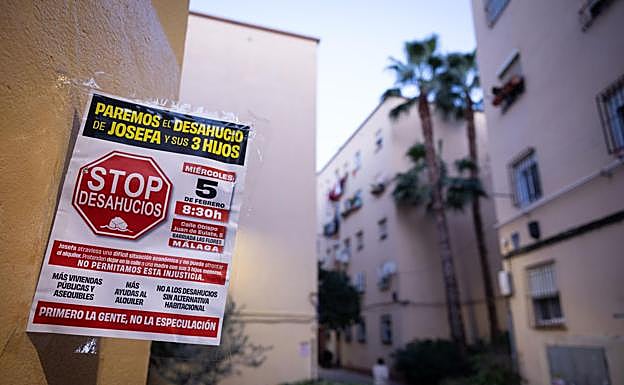
Zoom

So, on this occasion, the eviction has been irrevocable because the owner is a man over 65 years old who is "unwell", according to his solicitor.
The first residents of the neighbourhood who came to the house were soon joined by representatives of the Con Málaga association, such as Nicolás Sguiglia, as well as half a dozen National Police officers who were stationed at the entrance, forming a wall between the people and the doorway in a powerful and impressive image. There was some verbal confrontation between the officers and those gathered, but it did not escalate further. Sguiglia demanded a representative to negotiate with, while the police urged him to wait for either the property owner or the court clerk to arrive, stating that the officers were there merely to maintain order.
When all the key players were present, including the social emergency team, the negotiation was swift - to the point of being nonexistent; there was little to discuss.
“We need three people to help us carry down the family’s belongings,” someone said. Three pairs of hands quickly stepped forward, hauling down huge rubbish bags that contained clothes, along with mattresses, bed bases, and the equipment needed to keep a home clean. Everything was piled up in the middle of the street.
"Today it's my daughter, tomorrow it could be you, we must not stand idly by," Josefa's mother cried out from the window
Usually, social services send evicted families to a hostel for a few days, or to some other municipal dependency. Josefa and her children went straight to Loja, where they were picked up by relatives: she did not want her children to undergo the experience of staying in a hostel. Josefa was accompanied by her mother, who went to the window to send a message to those who had gathered below: "Today it is my daughter, tomorrow it could be you, we must not stand idly by."
On many occasions, families don't know what to do with their belongings, as they don't have the means to take them with them. Con Málaga rented a van so that all Josefa's belongings can reach Loja.
"There is little more we can do than to denounce this injustice that is going to be committed today: a neighbour with her three children is going to be forced to leave the city, to live very precariously in a very small house with relatives. The children are going to leave their friends, they are going to leave their school; in short, the life of this family is broken," explained Sguiglia, who added: "If Josefa did not have a family member who could accommodate them, we would see three young children living outdoors. The town hall and social services should have been here from the start to try to ensure that this doesn't happen: the administrations are obliged to try to guarantee people decent accommodation."
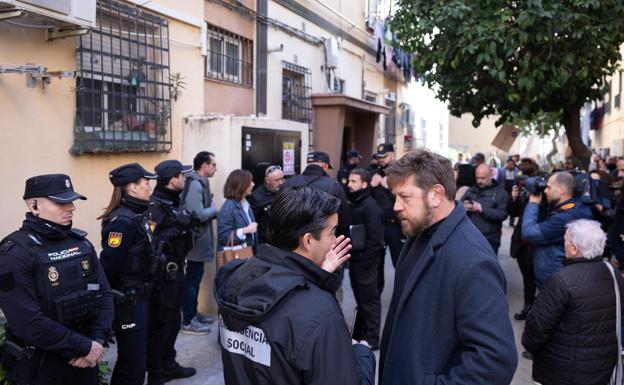
Zoom

Along with neighbours (especially female neighbours) and politicians, many members of the media also turned up. And the word spread: "Josefa won't come down until there are no cameras, she doesn't want to appear in the media, she doesn't want to make any statements." Meanwhile, the children were at school, so at least they would not be witnesses to the events that took place.
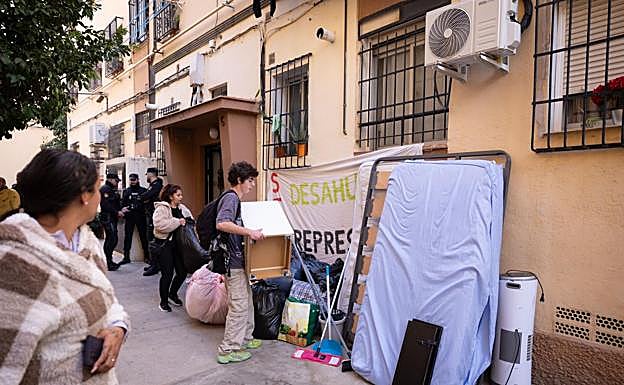
Zoom

In the more than three hours that passed between the arrival of the first people at Josefa's doorstep and the moment her belongings began to be taken out onto the street, many conversations took place among the neighbours, with numerous experiences and reflections shared.
And then, a turning point: three towering men with dark skin, all dressed in identical black clothing, appeared on the scene. A neighbour, Teresa Gómez, admitted that they were coming to her house, and her son showed the messages they had been receiving in an attempt to evict them from the flat. "Get out, hitmen!" the gathered crowd began to chant.
"Hitmen out!" the crowd began to shout when members of a pressure group appeared and went to the house of other neighbours
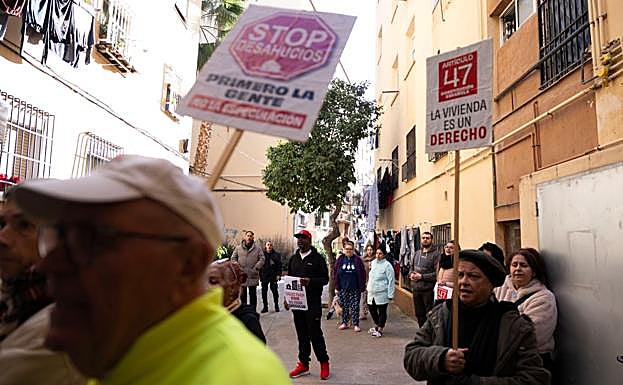
Zoom

Eva, who lives next door to Josefa, told SUR that the woman had been very nervous in the days leading up to the event, "because now, where is she going to put her children?"
"She has gone to all kinds of places and no one has helped her," said another woman from the neighbourhood. "No one thinks about what comes next for the children. This is a trauma for them, psychologically it’s a blow; the hard part starts from today," added another neighbour. "We’ve seen in this case that the school attachment is useless," added Pilar Usón, spokesperson for PAH, the platform for those affected by mortgages in Malaga..
"I was on a council grant, but now I'm a squatter because the owner of the house wants to sell it and that's why I don't get the benefit anymore," said another Las Flores resident
Usón added: "We are not going against the owner, he has the right to recover his home, but the city council has a budget of more than one billion euros and does not have measures to deal with emergency situations like this one. With the 2008 crisis we learned that there are many circumstances that can make you vulnerable. We are all potentially vulnerable."
Toni Morillas, spokesperson for Con Málaga, pointed out that even the municipal housing stock is inaccessible to people in need. "Families can't afford it," she said
"I had help from the council, but now I'm a squatter because the owner of the property wants to sell it and that's why I no longer receive the municipal benefit," said another resident, María Cortés. Another neighbour added: "Five years ago, the flats in Las Flores were sold for 50,000 euros and now they pay more than 100,000."

